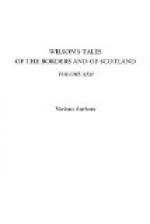Quitting this exhibition, and not a little displeased at being so egregiously bitten, I passed on to the next, which was “Mr. Higgenbotham’s Royal Menagerie. The Noblest Collection of Wild Beasts ever seen in the Civilised World.”
This was a splendid affair. On a narrow stage in front were seated four fat red-faced musicians, in beef-eater coats, puffing and blowing on bugles and trombones. Close by these, stood a thin, sharp-eyed, sallow-complexioned man in plain clothes, beating a huge drum, and adding the music of a set of Pandean pipes, which were stuck into his bosom, to the general harmony. This was Mr. Higgenbotham himself.
But it was the paintings on the immense field of canvas above that particularly attracted my attention. On this field were exhibited an appalling collection of the most terrific monsters: lions, as large as cows, gambolling amongst rocks; ourang-outangs, of eight feet in height, walking with sticks in their hands, as grave and stately as drum-majors; and a serpent, as thick as a hogshead, and of interminable length—in truth, without any beginning, middle, or end—twining round an unfortunate black, and crushing him to death in its enormous folds.
All this was irresistible. So up the stair I sprang, paid my sixpence, and in a moment after found myself in the centre of the well-saw dusted area in the interior, gazing on the various birds and beasts in the cages around me. It was by no means a perplexing task; for, as in the case of “The Great Lancashire Giant,” the fulfilment of the inside but little corresponded with the promise of the out. The principal part of the collection I found to consist of half-a-dozen starved monkeys, as many parrots—grey and green, an indescribable monster, in a dark corner, strongly suspected by some of the spectators of being a boy in a polar bear’s skin, a bird of paradise, and a hedgehog, which they dignified with the name of a porcupine.
“Whaur’s the lions, and the teegers, and the elephants, and the boy instructor, and the black man?” said a disappointed countryman, addressing a fellow in a short canvas frock or overall, who was crossing the area with a bucket of water.
“Ah! them’s all in the other caravan,” replied the man, “vich should ’ave been here on Monday night, but hasn’t coom yet, and we suppose has broken down by the way; but there’s a hanimal worth ’em all,” he added, pointing to the indescribable monster in the dark corner. “The most curiousest ever was seen. Take a look on him; and if you don’t own he is, I’ll heat him, skin and all. They calls him the great Guampa from South America.”
Having said this, the fellow, desirous, for reasons best known to himself, to avoid further questioning, hurried away, and disappeared at a side door.
It was just as this man left us, and as the small crowd of spectators, of whom I was one, who had surrounded him, were dispersing, that a gentleman—or a person, at least, who had the air and manner of one, although somewhat broken down in his apparel—came close up to me, and whispered in my ear, in a perfectly calm and composed tone—




